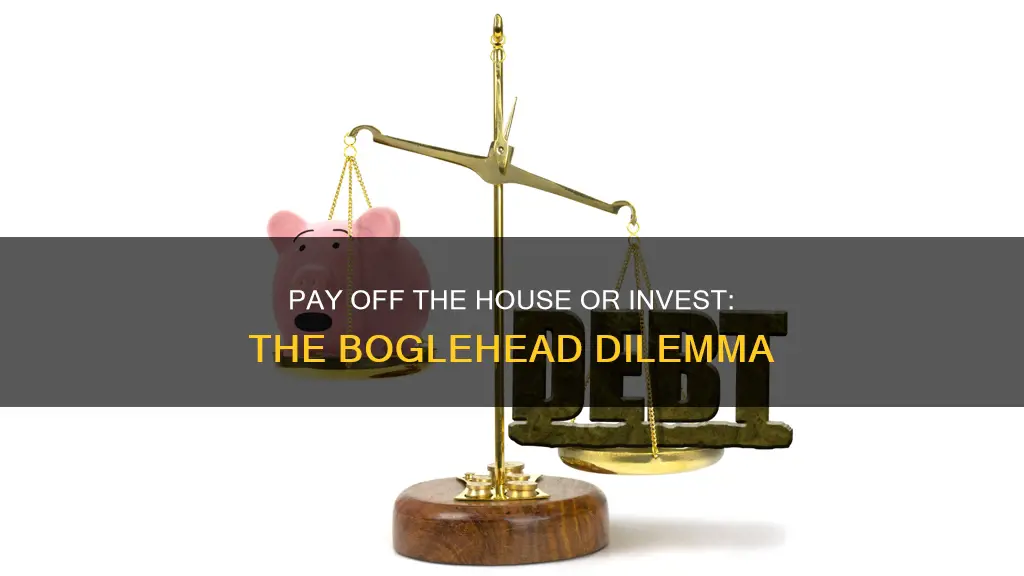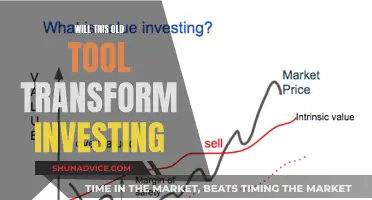
Bogleheads are passive investors who follow Jack Bogle's simple but powerful message to diversify with low-cost index funds and let compounding grow wealth. Jack Bogle founded Vanguard and pioneered indexed mutual funds.
The question of whether to pay off a mortgage or invest is a common one for Bogleheads. The answer depends on a variety of factors, including the interest rate on the mortgage, the expected return on investments, tax considerations, and personal preferences.
Many Bogleheads recommend prioritizing tax-advantaged accounts, such as 401(k)s and IRAs, over extra mortgage payments. They also suggest comparing the after-tax return on investments, such as treasuries or bonds, to the mortgage rate. If the after-tax return on investments is higher than the mortgage rate, then it may be more advantageous to invest rather than pay off the mortgage early.
Some Bogleheads also emphasize the importance of considering peace of mind and personal financial goals when making this decision. Paying off a mortgage can provide a sense of financial freedom and security, especially for those approaching retirement or with high-stress jobs.
Additionally, it's worth noting that paying off a mortgage early may not always be the most financially optimal choice, as investing the money instead could potentially lead to higher returns over the long term. However, with the recent increase in interest rates and inflation, some Bogleheads argue that it may be wiser to hold onto a low-interest mortgage and benefit from paying it back with cheaper, inflation-eroded dollars.
Ultimately, the decision to pay off a mortgage or invest depends on a combination of financial considerations and personal preferences.
| Characteristics | Values |
|---|---|
| --- | --- |
| Interest rate | 2.75% - 6.5% |
| Remaining mortgage | 9 - 28 years |
| Annual income | $400k |
| Current savings account interest rate | 5% |
What You'll Learn

Paying off a mortgage vs investing in stocks
Paying off a mortgage early or investing in stocks is a complex decision that depends on several factors, including interest rates, investment returns, tax implications, and personal preferences. Here are some key considerations to help make an informed choice:
Interest Rates and Investment Returns:
- Paying off a Mortgage Early: This option provides a guaranteed return equal to the interest rate on the mortgage. For example, paying off a 6.5% mortgage early saves you 6.5% on that debt. It's a risk-free return, and in a high-interest environment, it can be a compelling option.
- Investing in Stocks: Stocks typically offer higher potential returns over the long term compared to the interest rate on a mortgage. However, investing in stocks comes with higher risk and volatility. The stock market can be unpredictable, and there are no guarantees on investment returns.
Tax Implications:
- Paying off a Mortgage Early: The interest paid on a mortgage may be tax-deductible, reducing the effective cost of the mortgage. In the US, for example, mortgage interest is tax-deductible up to a certain limit. Paying off the mortgage early may result in losing this tax benefit.
- Investing in Stocks: Investments held in taxable accounts may generate capital gains, which are typically taxed at lower rates than ordinary income. Additionally, investments held in tax-advantaged accounts, such as retirement accounts, may provide further tax benefits.
Personal Preferences and Peace of Mind:
- Paying off a Mortgage Early: For some individuals, the idea of being debt-free and owning their home outright provides a sense of security and peace of mind. It simplifies their finances and reduces monthly expenses, freeing up cash flow for other purposes.
- Investing in Stocks: For others, investing in stocks may offer greater flexibility and the potential for higher returns. However, it also carries the risk of market downturns and the possibility of losing money.
Ultimately, the decision to pay off a mortgage early or invest in stocks depends on a combination of financial factors and personal preferences. It is essential to carefully consider the interest rates, expected investment returns, tax implications, and one's risk tolerance and financial goals before making a decision.
Celebs Who Invested with Bernie Madoff
You may want to see also

The pros and cons of paying off a mortgage early
Paying off a mortgage early can be a difficult decision to make. Here are some pros and cons to help you decide.
Pros of paying off a mortgage early:
- Reducing future loan balance: Paying off a loan early will reduce your future loan balance, eventually eliminating future loan payments or giving you more money when the loan is paid off.
- Peace of mind: For many investors, the peace of mind from not having a loan is valuable.
- Simplifying your life: Once a loan is paid off, your life is simplified. The money budgeted for this loan can now be used elsewhere, such as investing.
- Possibly higher returns: If you can find an investment with a higher interest rate than your mortgage, you may be able to get higher returns by investing your money instead of paying off your mortgage early.
- Tax benefits: Depending on your location and tax situation, you may be able to take advantage of tax benefits by keeping your mortgage. For example, if you itemize your deductions, you may be able to deduct mortgage interest from your taxable income.
- Liquidity: Keeping your mortgage can provide liquidity, as you can choose to sell your house and get back some of the money you invested in it. If you pay off your mortgage early, you may not be able to get that money back without taking out another loan.
- Inflation: If inflation is high, your fixed-rate mortgage may become cheaper in real terms over time. This means you'll be paying back the loan with dollars that are worth less, effectively reducing the cost of your debt.
Cons of paying off a mortgage early:
- Opportunity cost: Paying off your mortgage early means you won't have that money available for other purposes, such as investing or emergency funds.
- Limited financial freedom: If you pay off your mortgage early, you may have less financial freedom as your money is tied up in your house.
- Possibly lower returns: If you invest your money instead of paying off your mortgage early, you may get lower returns, especially if you invest in low-risk assets like bonds or CDs.
- Reinvestment risk: If you invest your money instead of paying off your mortgage early, you take on reinvestment risk. This means that if interest rates fall, you may not be able to find investments with the same or higher returns as your mortgage interest rate.
- Loss of tax benefits: If you pay off your mortgage early, you may lose any tax benefits associated with it, such as the ability to deduct mortgage interest from your taxable income.
- Early repayment fees: Depending on your mortgage agreement, you may have to pay early repayment fees if you pay off your mortgage early. These fees can eat into the savings you would have made by paying off your mortgage early.
US Investment Trends: Where's the Money?
You may want to see also

The emotional benefits of paying off a mortgage
Paying off your mortgage can bring a wide range of emotional benefits. Here are some of the most significant ones:
Peace of Mind and Reduced Stress
The feeling of owning your home outright can bring peace of mind and reduce financial stress. Eliminating one of your largest recurring expenses can be incredibly satisfying and freeing. You no longer have to worry about monthly mortgage payments, and you have the security of knowing that your finances won't suffer during economic hardships or uncertain employment. This can be especially beneficial for those approaching retirement and looking to live on a fixed income.
Improved Emotional Wellbeing
Struggling with debt can take a toll on your mental health. Paying off your mortgage can reduce the weight of this burden and provide greater peace of mind, which is invaluable during uncertain times. It can also improve your overall emotional wellbeing and health.
Increased Financial Security and Flexibility
Paying off your mortgage early can improve your financial security and flexibility. You'll have extra money to save, invest, or use for other goals. This extra financial freedom enables you to make bigger purchases, such as a new car or your dream home. It also allows you to pursue other economic opportunities, such as starting your own business or investing in rental properties.
Sense of Accomplishment and Pride
There is a sense of accomplishment and pride that comes with fully owning your home. It can be a significant milestone and provide a feeling of true homeownership.
Motivation for Other Financial Goals
Paying off your mortgage can serve as a motivation to work towards other financial goals. Some people find that being debt-free gives them the confidence to take bolder financial decisions, such as changing career paths or pursuing part-time work.
Invest in Cars: Buyer's Guide
You may want to see also

The opportunity cost of paying off a mortgage early
Paying off your mortgage early can be an enticing prospect, but it's important to consider the opportunity cost of doing so. Here are some key points to keep in mind:
Peace of Mind and Financial Flexibility
While the idea of being debt-free can be appealing, it's important to weigh that against the financial flexibility you'd have by investing your money instead. Paying off your mortgage early means tying up your wealth in an illiquid asset. If you face a financial emergency or want to seize an investment opportunity, you'd have to sell your house to access that capital, which isn't a quick or easy process.
Interest Rates and Returns
Mortgage rates are currently at historic lows. This means it's cheaper to hold debt, and you have the opportunity to grow your wealth through other investments with higher potential returns. For example, the S&P 500 has returned an average of 10% to 11% annually since its inception in 1926. Even with conservative estimates, investing in an index fund that tracks the S&P 500 could yield higher returns than paying off your mortgage early.
Tax Implications
If you choose to pay down your mortgage instead of investing in tax-advantaged retirement accounts, you'll miss out on tax savings. Additionally, you may lose out on tax deductions for mortgage interest if you normally itemize your deductions.
Sequence of Returns Risk
If you're investing for the long term, such as for retirement, keeping your mortgage could help reduce sequence of returns risk. This risk refers to the possibility of facing a string of negative returns early in your investment timeline, which can significantly impact your overall returns. By keeping your mortgage, you can invest your money and potentially benefit from higher returns over time, rather than locking in the "return" of paying off your mortgage early.
Psychological Benefits
There is a certain peace of mind that comes with being debt-free. Paying off your mortgage early can reduce your financial stress and simplify your life. Additionally, it can lower your minimum monthly payments, which could be beneficial in an emergency situation.
Guidelines for Making the Decision
Ultimately, the decision to pay off your mortgage early or invest depends on your financial situation and risk tolerance. Here are some guidelines to consider:
- Invest in tax-advantaged accounts first: Prioritize maxing out contributions to accounts like 401(k)s and IRAs before considering paying off your mortgage early.
- Compare interest rates and returns: If the after-tax return on investments like treasuries is higher than your mortgage rate, it may be more financially beneficial to invest rather than paying off your mortgage early.
- Weigh the risks: Consider your risk tolerance and investment timeline. The stock market has more volatility than the housing market, so ensure your investing timeline is long enough to weather potential ups and downs.
- Build an emergency fund: Before committing to paying off your mortgage early, ensure you have a significant emergency fund in place. This will provide a financial buffer and reduce the need to borrow money at higher interest rates if unexpected expenses arise.
Rich Investors: Why Startups?
You may want to see also

The tax implications of paying off a mortgage
Paying off a mortgage early can have several tax implications. Firstly, mortgage interest is tax-deductible, so paying off a mortgage early reduces the interest expense and the corresponding tax shield. This can result in higher taxes for the individual. Additionally, the increased standard deduction implemented by the Tax Cuts and Jobs Act (TCJA) may reduce the tax benefits of having a mortgage, as more taxpayers are likely to claim the standard deduction instead of itemizing their deductions. This is especially relevant for retirees who are close to their mortgage payoff date, as the loan may not generate enough tax-deductible interest to justify itemizing.
On the other hand, if the proceeds of a home equity loan are used to "buy, build, or substantially improve" the home, the interest may still qualify as deductible mortgage interest, even under the TCJA. This can provide tax benefits for homeowners who choose to pay off their mortgage early.
Furthermore, the tax implications of paying off a mortgage early can be influenced by an individual's income tax rate and the availability of other tax-advantaged investment options. For example, investing in tax-advantaged accounts, such as a 401(k) or IRA, may provide greater tax benefits than paying off a mortgage early. Additionally, the opportunity cost of paying off a mortgage early should be considered, as investing in certain types of assets may offer higher returns than the interest saved by paying off a mortgage early.
Startups: Invest or Avoid?
You may want to see also
Frequently asked questions
It depends on your mortgage rate, investment options, and personal preference. If your mortgage rate is low, you may get a better return by investing. However, paying off your mortgage can give you peace of mind and simplify your finances.
Compare the after-tax cost of your mortgage with the expected return on your investments. Also, consider your risk tolerance, liquidity needs, and tax implications.
Paying off your mortgage early can reduce your interest costs, provide a guaranteed return, and lower your monthly payments. It can also give you a sense of financial freedom and security.
Investing may offer higher potential returns over the long term, especially if your mortgage rate is low. Investing can also provide liquidity and allow you to take advantage of compound interest.







